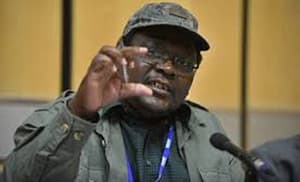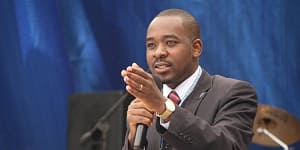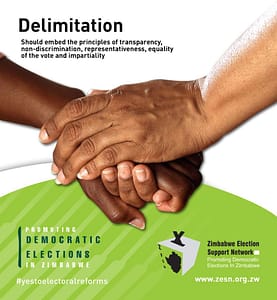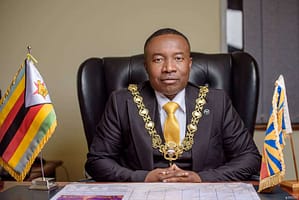Let’s not beat about the bush: South Africa is a failed state, now let’s all stand up and fix it
SA President Cyril Ramaphosa going through hell for endorsing Mnangagwa
An incorrigible, corrupt demagogue was catapulted to the Union Buildings and sold the state to the highest bidder. The capture of the state by the Guptas was the last straw that broke the back of South Africa’s economy.
To say South Africa is on the precipice is an understatement; the state has collapsed. Ours has all the hallmarks of a “failed state”.
However, the patient is not yet at the graveyard. She is in the intensive care unit and can still be rescued. Thus, public discourse must henceforth be about how to fix South Africa.

But we need first to diagnose the disease and its causes in order to find an appropriate remedy. We also need to understand how we got here for us never to repeat the same mistakes.
In their tome, Why Nations Fail, Daron Acemoglu and James Robinson present compelling theories on and explanations about failed states. Their treatise is that “countries become failed states not because of their geography or their culture, but because of the legacy of extractive institutions, which concentrate power and wealth in the hands of those controlling the state, opening the way for unrest, strife and civil war.”
That is exactly the source of South Africa’s collapse. Instead of building an inclusive economy, we nurtured an exclusive one that benefitted few individuals while leaving millions destitute. Hence, we continue to suffer the ignominy of the most unequal society in the world despite our abundant mineral resources.

We threw merit out of the window and allowed mediocrity to fester in all state institutions. Individual effort, expertise or talent no longer guarantee success. Ours is an economy in which it is who you know that guarantees success rather than what you know.
Rot sets in
The majority of the nouveau riche who ostentatiously flaunt their wealth are beneficiaries of patronage, not success tales of hard work and effort. Crony capitalism thrived instead of broad-based empowerment. The so-called BEE was a fuss; cadres enriched each other through BEE deals while leaving the masses in squalor and poverty.
An incorrigible, corrupt demagogue was catapulted to the Union Buildings and sold the state to the highest bidder. The capture of the state by the Guptas was the last straw that broke the back of South Africa’s economy.
We are now in an unfortunate position where Nigeria was in 1977 when Chinua Achebe decried the consequences of a cult of mediocrity that fast-tracked that country into a failed state.
Lamenting in his essay on The Trouble with Nigeria, Achebe said: “Look at our collapsing public utilities, our inefficient and wasteful parastatals and state-owned companies. If you want electricity, you buy your own generator, if you want water, you sink your own borehole; if you want to travel, you set up your own airline. One day soon… you will have to build your own post office to send your letters!”
We are already there. Rolling blackouts — “load shedding” — have become the norm and those who can afford it are getting off the grid. Towns and villages are rationing water. Trains are off the rails. The post office is unreliable. Civil servants in state-owned enterprises are lucky if they get paid on time. These are the hallmarks of a failed state.
But we also got here because we decimated crucial accountability mechanisms such as Parliament. We sent a bunch of praise singers to Parliament instead of credible representatives of the people.
Thus, when they were called upon to hold the executive to account and to end Jacob Zuma’s looting spree, they failed. They instead sang: “Hail to the thief!” There could never have been proper accountability where the elected representatives fear party bosses more than the people who elected them.
Institutional foundations
In The Social Contract, Jean-Jacques Rousseau observes that “The legislative power is the heart of the state, the executive is the brain, which sets all the parts in motion. The brain may become paralysed and the individual still lives. A man can be an imbecile and survive, but as soon as his heart stops functioning, the creature is dead.”
In South Africa both the legislature and the executive were paralysed, leaving the country in the intensive care unit.
Meanwhile, a country like Italy survived the imbecility of Silvio Berlusconi because they have strong institutional foundations. On the contrary, Jacob Zuma was given free rein because the legislature, too, was comatose.
Cyril Ramaphosa and his cohorts have not only been part of the cause of our relapse, they benefitted handsomely from the extractive economic system “which concentrates power and wealth in the hands” of the few who are “controlling the state” creating a perfect environment for unrest, strife and mayhem that we witnessed in July 2021.
Visit www.zimbabweobserver.com.au for more news in depth
It is precisely for these reasons that they are neither the appropriate team nor do they have the political will to rebuild our country. A new team of reformers must take over and rebuild South Africa anew.
However, we must never be under any illusion that it will be quick and easy to rebuild. The task of fixing South Africa will be long and arduous. Daunting as it may be, it can and must be done.
The beginning of that process of rebuilding is to learn from others. There are models out there that we can adapt to rebuild our country. One of them is Singapore. According to Kishore Mabhubani, former dean of Lew Kuan Yew’s school of Public Policy at the National University of Singapore, the secret of Singapore’s success was based on three pillars, namely, meritocracy, pragmatism and honesty, i.e. “mph”.
Under Lew Kuan Yew, Singapore never compromised on meritocracy. They selected the best among themselves to lead state institutions. Excellence trumped mediocrity. Yew was a pragmatist, not an ideologue. He implemented policies that worked irrespective of ideology. Like his neighbour Deng Xiaoping of China, he said, “it does not matter if the cat is black or white, as long as it catches mice.”
Yew promoted honesty among public figures and civil servants; and punished corrupt individuals harshly. For example, when a deputy minister went on a trip sponsored by a businessman, he was arrested on arrival at the airport and sent to jail.
South Africa could be better if we implemented Lew Kuan Yew’s “mph” formula. The starting point is to elect and promote ethical leadership. We need servant leaders — leaders who are not in politics for themselves but who are in politics to serve.
Part of the reforms for our democratic system must be the introduction of a vetting system that would require leaders to pass a corruption test before they are eligible for an election. An institution such as the Financial Intelligence Centre should be mandated to issue a report on all candidates before they are elected and no one found wanting should be allowed to pass through the proverbial “eye of the needle”.
However, we also need to pay attention to specific areas of the economy in order to rebuild a thriving society. Education and factories should be at the top of our priority list. We need a new curriculum and a new pedagogy that will empower the youth with relevant sets of skills, whet their appetite for knowledge, inject a good dose of self-confidence and instill the spirit of independence and self-reliance.
Education reform
The reform of our public education must begin with appointing appropriately qualified and experienced education reformers at the helm of education authorities. From the minister, the provincial members of executive councils, to the directors general responsible for education, no one must be appointed without at least a master’s degree in education. The time for loudmouths is over.
We must fix our schools to be places where teachers go to teach and learners learn. Unionism must not thrive at the expense of learners. Learners must, in addition to subject knowledge, come out of the schooling system having learnt ethical values, responsibility, discipline and respect.
We must also compel all public representatives (ministers, members of Parliament, members of provincial legislatures and municipal councillors), officials employed in public education facilities (from directors general of education, school principals and teachers, including cleaners) to enrol their children in public schools.
The same must be done for public health. The time for people to legislate and manage facilities that they have no confidence in must come to an end.
Economic reconstruction
Meanwhile, our economy needs a complete overhaul. You only need to look at the toys our kids play with, the cars we drive, the clothes we wear, the phones we use, the computers in our offices, the television screens in our homes and so on and so forth, to realise that we are a country that consumes the products of other people.
In his book, The Rise and Fall of Nations, Ruchir Sharma implores those who want to rebuild their nations to build “factories first”. The lessons from successful nations, especially the Asian Tigers, is that investment in factories helps to create employment, stimulate economic growth, and build sustainable export bases.
Instead of building factories first, we saw shopping malls mushrooming all over. And we did not care whence the goods came. The truth is that there is no way we can reduce our 39% unemployment rate without factories that employ people en masse.
South Africa should reindustrialise, increase investment in research and innovation and re-skill her people meaningfully to participate as producers rather than mere consumers of other people’s goods. Hence the proposal to revive old neglected industrial areas in our neighbourhoods must be welcomed.
When someone is in ICU, it is too risky to let bogus doctors and interns meddle with the patient. Similarly, the doctors who have failed until the patient deteriorates to the ICU must give space for experts to come to the rescue.
It is time for mediocrity to step aside for experts, experienced professionals with track records and credibility to come in and fix South Africa. Professionals in the private sector and non-governmental organisations must realise that there is no messiah out there who is going to fix SA for them. They must heed the national call and avail their expertise to rebuild South Africa.
In our corners, in our communities, villages and townships, let’s do our part and contribute. Let us all stand up and fix South Africa. DM
—Brutus Malada is a political strategist and a research consultant. He previously served as a specialist writer and communications adviser for the rector of the University of the Western Cape. He has worked in various think tanks, including the Human Sciences Research Council and the Centre for Politics and Research. He was a member of the Midrand Group – a loose association of intellectuals in Johannesburg.






